New York, NY (November 5, 2018) – Seeking to address a 171-year-old act of racial discrimination, The New York Academy of Medicine has conferred a posthumous award of Academy fellowship upon Dr. James McCune Smith (1813-1865), a prominent African-American physician and abolitionist from whom this honor was previously withheld in 1847. The award was presented at the Academy’s 171st Anniversary Discourse & Awards ceremony on November 1, 2018.
“Dr. McCune Smith’s story is 171 years old but has relevance to the inequities of today,” Academy President Dr. Judith A. Salerno said in her remarks at the event. “While this award cannot change our past, we hope that this recognition will help define our values as an organization going forward. Dr. McCune Smith died in 1865, the year slavery was abolished in the U.S. He died a free man but not a Fellow. We will right that historic wrong today.”
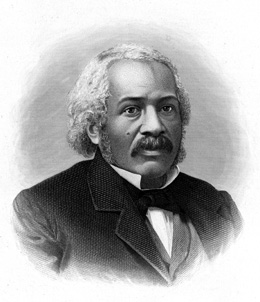 Dr. McCune Smith was born in New York City in 1813, the son of a freed slave named Lavinia. He sought to study medicine but was not admitted to a U.S. medical school because of his race, so he left to study at the University of Glasgow where he earned a BA, MA and MD, returning to the U.S. as the first university-trained African-American physician. He went on to have a distinguished career, treating both white and black patients in lower Manhattan, as staff physician and later medical director for the Colored Orphans Asylum, and as a pharmacist. He was a scholar as well, publishing the first medical scientific paper by an African-American in this country, and a number of articles that used sophisticated statistical analyses to disprove prevailing theories of racial inferiority. He was also a staunch abolitionist, an ally and friend of the great Frederick Douglass.
Dr. McCune Smith was born in New York City in 1813, the son of a freed slave named Lavinia. He sought to study medicine but was not admitted to a U.S. medical school because of his race, so he left to study at the University of Glasgow where he earned a BA, MA and MD, returning to the U.S. as the first university-trained African-American physician. He went on to have a distinguished career, treating both white and black patients in lower Manhattan, as staff physician and later medical director for the Colored Orphans Asylum, and as a pharmacist. He was a scholar as well, publishing the first medical scientific paper by an African-American in this country, and a number of articles that used sophisticated statistical analyses to disprove prevailing theories of racial inferiority. He was also a staunch abolitionist, an ally and friend of the great Frederick Douglass.
In 1847, the year the Academy was established, Dr. McCune Smith’s name was advanced to the Committee on Admissions for Fellowship. The Academy leadership asked him to withdraw his nomination because it was “inexpedient,” but they couldn’t justify denial of fellowship to one of the foremost, most respected black physicians of his time who met all the qualifications. His nomination was tabled and soon thereafter withheld.
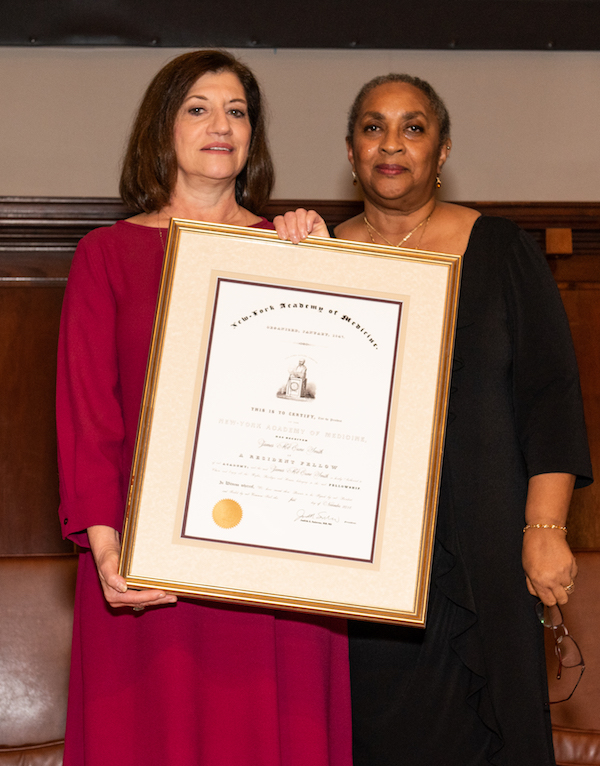 At the 2018 Discourse & Awards ceremony, the award was accepted by Professor Joanne Edey-Rhodes on behalf of Dr. McCune Smith’s family. Dr. Edey-Rhodes, a faculty member in the Department of Africana and Puerto Rican/Latino Studies at Hunter College, City University of New York, has a special relationship with the McCune Smith family. She was teaching a course on the History of Blacks in New York at Hunter College in 1996. One of her students, Greta Blau, first learned about Dr. McCune Smith in this course—and then later found out she was, in fact, Dr. McCune-Smith’s great-great-great-granddaughter, after recognizing his name inscribed in a bible belonging to her grandmother.
At the 2018 Discourse & Awards ceremony, the award was accepted by Professor Joanne Edey-Rhodes on behalf of Dr. McCune Smith’s family. Dr. Edey-Rhodes, a faculty member in the Department of Africana and Puerto Rican/Latino Studies at Hunter College, City University of New York, has a special relationship with the McCune Smith family. She was teaching a course on the History of Blacks in New York at Hunter College in 1996. One of her students, Greta Blau, first learned about Dr. McCune Smith in this course—and then later found out she was, in fact, Dr. McCune-Smith’s great-great-great-granddaughter, after recognizing his name inscribed in a bible belonging to her grandmother.
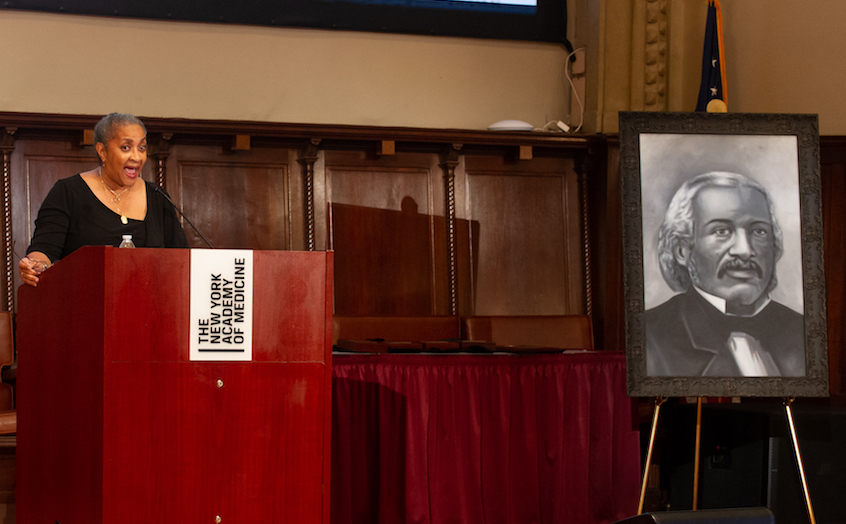 “On behalf of the family, the descendants of Dr. James McCune Smith, I would like to say thank you to the Academy, and I especially want to say thank you to Dr. Salerno for her leadership in making this come to fruition,” Professor Edey-Rhodes said.
“On behalf of the family, the descendants of Dr. James McCune Smith, I would like to say thank you to the Academy, and I especially want to say thank you to Dr. Salerno for her leadership in making this come to fruition,” Professor Edey-Rhodes said.
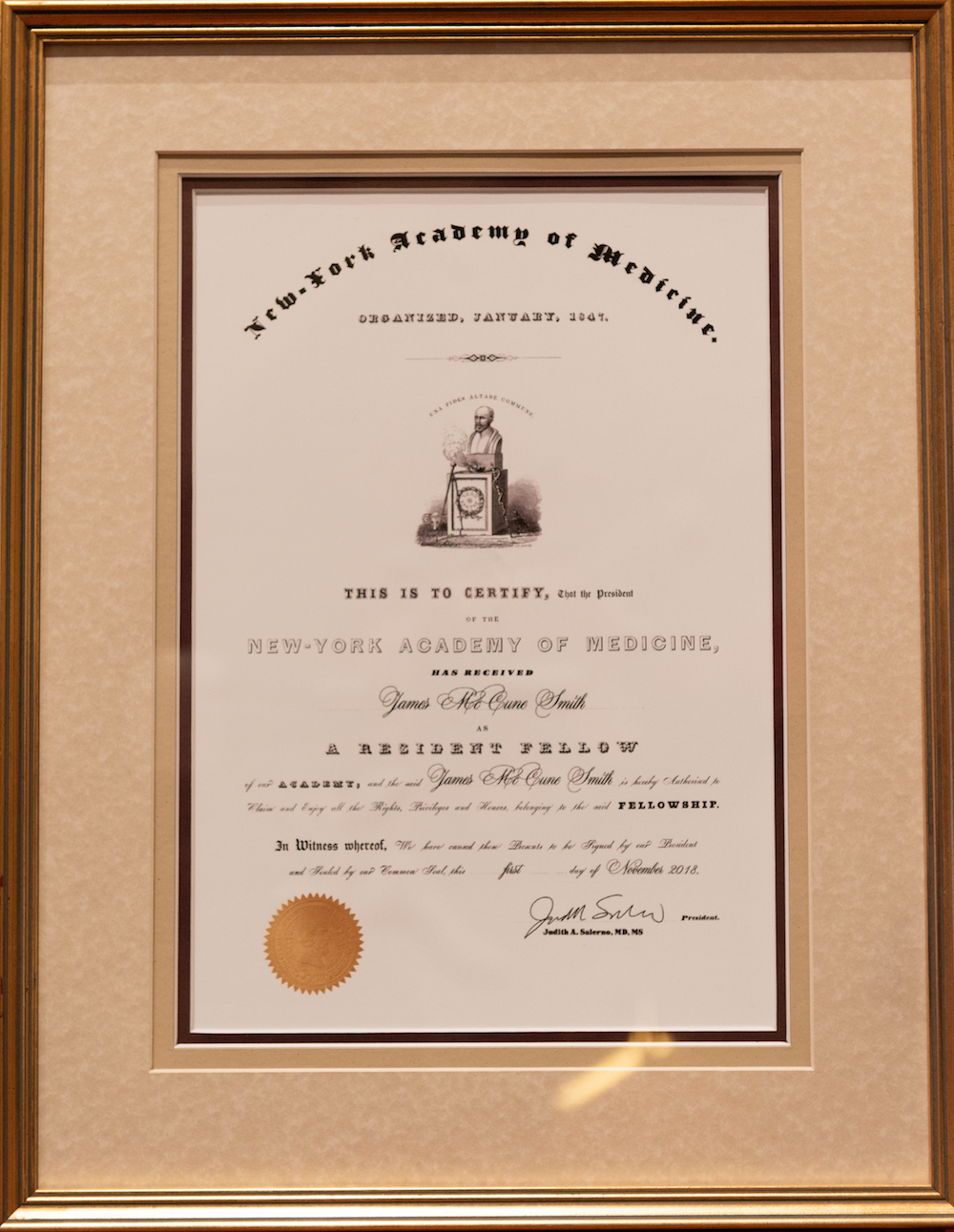 The certificate of fellowship prepared for Dr. McCune Smith is a replica of the certificate that he would have received had he been inducted in 1847.
The certificate of fellowship prepared for Dr. McCune Smith is a replica of the certificate that he would have received had he been inducted in 1847.
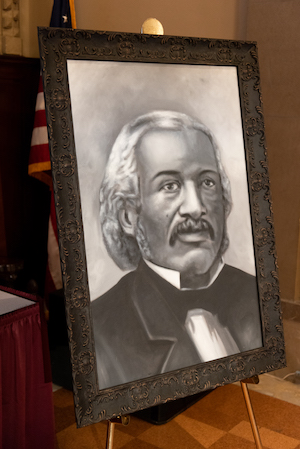 A portrait of Dr. McCune Smith by artist Junior Jacques, donated to the Academy by one of its Fellows, Dr. Daniel Laroche, will be prominently displayed with an inscription about his contributions to the medical profession and the story behind his fellowship. The Academy has also placed a brass plaque on a seat in the second row of its auditorium in his honor.
A portrait of Dr. McCune Smith by artist Junior Jacques, donated to the Academy by one of its Fellows, Dr. Daniel Laroche, will be prominently displayed with an inscription about his contributions to the medical profession and the story behind his fellowship. The Academy has also placed a brass plaque on a seat in the second row of its auditorium in his honor.
About The New York Academy of Medicine
Established in 1847, The New York Academy of Medicine is dedicated to ensuring everyone has the opportunity to live a healthy life. Through our original research, policy and program initiatives we provide the evidence base to address the structural and cultural barriers to good health and drive progress toward health equity. This work and our one-of-a-kind public programming are supported by our world class historical medical library and our Fellows program, a unique network of more than 2,000 experts elected by their peers from across the professions affecting health.
View our COVID-19 Safety Protocols for attending NYAM public events.